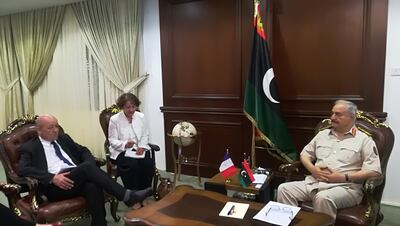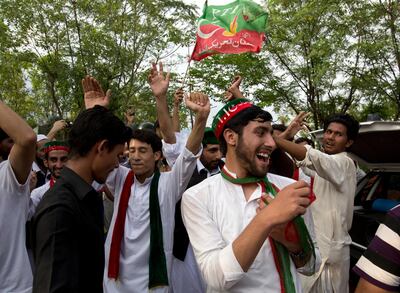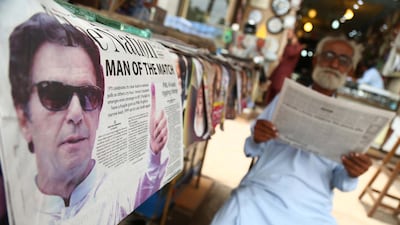Imran Khan claimed victory in Pakistan's general election after a widely disputed poll appeared to put him within reach of power.
The former fast-bowler said he now had a mandate for his populist vision of a new Pakistan and dismissed accusations of widespread vote-rigging from his political rivals.
He called for talks over Kashmir to solve Pakistan's stand-off with India and said he would seek mutually beneficial ties with Washington.
With the official result delayed, preliminary forecasts put Mr Khan’s Pakistan Tehreek-i-Insaf (Pakistan Justice Movement) within touching distance of an overall majority. He is expected to easily court enough small allies to form a government.
Speaking in a broadcast speech, he said: "We were successful and we were given a mandate.”

He claimed the elections were the "most transparent" in the country's history and said there had been no “political victimisation”.
He vowed to live up to campaign promises to tackle corruption that was "eating our country like a cancer".
Electoral rivals said they rejected the vote however after it delivered an unexpectedly large lead for Mr Khan. The Pakistan Muslim League (PML-N), which had led the country since 2013, said there had been blatant vote-rigging. Polling monitors had been kicked out during counting and results had been seen lengthy delays. Mr Khan is widely thought to have benefited from the military trying to sabotage his rivals during the campaign.
Last night it was not immediately clear what action the other parties would take. European Union election monitors are due to report their findings on whether the poll was free and fair on Friday.
Mr Khan's victory would seal a remarkable transition for the 65-year-old, from cricketing playboy to conservative statesman at the head of a 210 million-strong nuclear power.
For years his nationalist and anti-corruption messages failed to cut through the stranglehold of the country's mainstream parties and he spent much of the past two decades on the political fringes.
Jan Achakzai, a political commentator, likened Mr Khan's populist appeal to that which had already seen Recep Tayyip Erdoğan rise to power in Turkey and Mahathir Mohamad in Malaysia.
“Definitely he's going to be the prime minister of Pakistan,” he said. “He will find it very easy to get support from small parties and independent candidates.
“There have always been complaints regarding irregularities in Pakistan's elections. Today the losers are saying there is rigging, we don't know yet if that was systematic. But they have to say something, we don't have a democracy where people admit defeat.”
The unexpectedly strong performance came after pre-election polls had put him only marginally ahead of the PML-N. Yet by Thursday evening, unofficial predictions put him on course for around 120 of the assembly’s 272 seats, versus half that for the league.

Markets welcomed the result. Financial analysts suggested Mr Khan's strong showing would allow him to rule without messy coalition negotiations. It would put him in a strong position to negotiate a badly needed bailout from the International Monetary Fund and make reforms to widen the country's tax net and cut its black market.
Others were less optimistic. Azeema Cheema, a political analyst said she was "very concerned" supporters of rival parties would reject the vote, with potentially violent consequences.
"It depends on how the civilian disobedience is being organised. You may have spontaneous riots among political party workers. Then maybe political parties will organise sit-ins and demonstrations," she told AFP.
_______________
Read more:
Pakistan rolls out unprecedented security operation ahead of election
Editorial: Stability is crucial before Pakistan election
Pakistanis mourn after election rally bombing kills 128
Nawaz Sharif returns to Pakistan to face jail before elections
_______________
Shahbaz Sharif, leader of the PML-N, said in the hours after polling closed he would “use all political and legal options for redressal of these glaring excesses.
“This is an outright rigging and the results based on massive rigging will cause irreparable damage to the country.
“Our democratic process has been pushed back by decades. Had the public mandate been delivered in a fair manner, we would have accepted it happily. “
Mr Khan has an unenviable to-do list if he takes power. The first priority is dealing with a debt crisis and fast devaluing currency. The country also still faces threats from militants as illustrated by the more than 200 killed in attacks during the election campaign and polling day. Large parts of the country are also acutely short of water for its fast-growing population.
Mr Khan had last night begun speaking to allies to form his government. A caretaker administration has been in place since the national assembly was dissolved for campaigning.

